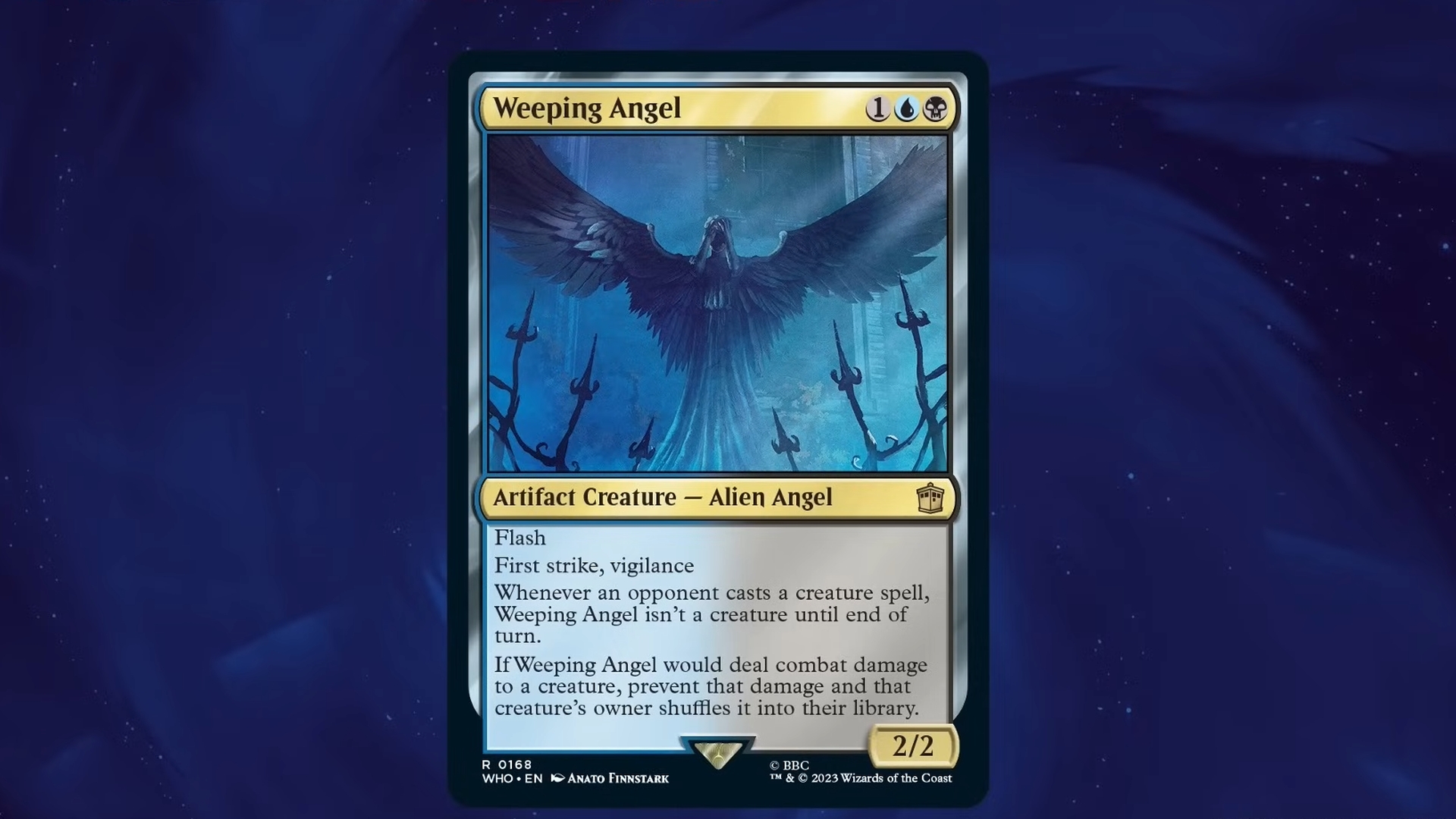Magic: The Gathering turns Doctor Who's heroes and villains into cardboard while remaining impressively accurate to their core
Like the Tales of Middle-earth set, it's a blast to recognize mechanics inspired by specific parts of the fiction.

Doctor Who used to have a reputation as a kids' show that kids were too scared to watch, that they saw in glimpses while hiding behind the couch. These days it's more of a comfort-blanket experience—except for when the weeping angels show up and suddenly even grown adults are tempted to take cover behind the furniture. It's important for a crossover to capture some of that magic, and Magic: The Gathering absolutely does.
The Weeping Angel card has a bunch of tags that emphasize speed (first strike, flash, vigilance) and an ability that represents it transforming into a statue when seen (it stops counting as a creature on any turn when an opponent summons a creature). Best of all, whenever it would damage something, the creature it would hurt instead gets shuffled back into its owner's deck. The angel sends them to a random place in your library as if it's hurling them across time. That's a real chef-kiss card effect, and one that is super fun to see in action.
Magic's Doctor Who crossover is available as a bunch of preconstructed Commander decks, like the Warhammer 40,000 crossover was. I was torn between the Timey-Wimey deck because Christopher Eccleston is in it (along with David Tennant and Matt Smith), and Blast from the Past, which has Tom Baker and all the other classic era Doctors (and which I ended up playing with). But after seeing an opponent with the Masters of Evil deck throw down a Weeping Angel, the bad guys seem like a great choice.
Though I did like my Blast from the Past deck. The Fourth Doctor lets you play a card off the top of your library and get a free food token whenever you do, and of course the food token included looks like a bag of jelly babies. (In a cute deep-cut touch, there's a treasure token that looks like a painting of Romana as the Mona Lisa, referring to the fakes from City of Death.) Meanwhile, Sarah Jane Smith generates clue tokens, fitting her newshound background, and Adric can be sacrificed to counter an opponent's ability, fitting his status as the first companion to die on-screen.
One of the most thematically appropriate touches is the return of the planechase system. A bonus set of oversized cards represents locations you hop between over the course of a game, each with a significant mechanical effect. The Planet of the Cheetahs, for instance, lets each player add two +1/+1 counters to a creature each turn, as well as giving them the "cat" creature type. I'd forgotten this, but the last storyline of the classic series really did take place on a planet that turned people into cats who looked like a cross between the facepaint children get at a school fete and Cats the musical, which was exactly as upsetting as that sounds.
Anyway, that was how my opponent made a dalek into a cat. Given the actual show had one turn into a Mafia goon, that tracks.

The Doctor Who cards do include some complicated interactions, with keywords like provoke and cascade, as well as expecting you to remember which cards count as "historic" (that's artifacts, legendaries, and also sagas, a thing I need to look up every time). It's aimed at enfranchised Magic players who are also hardcore Whovians, people who are just as likely to understand the finer points of the goad mechanic as they are to know who Peri Brown and Detective Duggan were. If you're in the overlap of that particular Venn diagram, this combination will be your fish fingers with custard.
Keep up to date with the most important stories and the best deals, as picked by the PC Gamer team.
Doctor Who x Magic: The Gathering is available from October 13.

Jody's first computer was a Commodore 64, so he remembers having to use a code wheel to play Pool of Radiance. A former music journalist who interviewed everyone from Giorgio Moroder to Trent Reznor, Jody also co-hosted Australia's first radio show about videogames, Zed Games. He's written for Rock Paper Shotgun, The Big Issue, GamesRadar, Zam, Glixel, Five Out of Ten Magazine, and Playboy.com, whose cheques with the bunny logo made for fun conversations at the bank. Jody's first article for PC Gamer was about the audio of Alien Isolation, published in 2015, and since then he's written about why Silent Hill belongs on PC, why Recettear: An Item Shop's Tale is the best fantasy shopkeeper tycoon game, and how weird Lost Ark can get. Jody edited PC Gamer Indie from 2017 to 2018, and he eventually lived up to his promise to play every Warhammer videogame.

